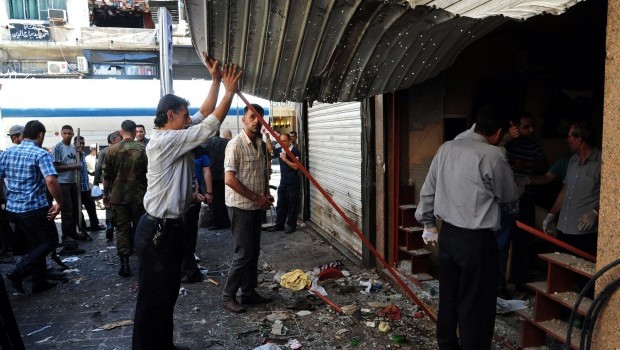
Syrians inspecting damage to shops in central Damascus following two explosions on June 11, 2013. (AFP PHOTO / SANA)
Government-owned TV channel Al-Ikhbariya reported that the city’s Marjeh square was attacked by two suicide bombers during rush hour, killing 14 people and wounding over 30 more.
The Syrian Observatory for Human Rights (SOHR), an activist group based abroad, said that 15 people were killed, and that most of the casualties were police officers at the area’s Al-Indibat police station.
The SOHR also reported that one of the explosions was the work of a suicide bomber who detonated his device inside the station.
A previous car bombing in Marjeh Square, where Syria’s Interior Ministry is located, killed five people at the end of April.
Residents told journalists after the latest attack that the area had become quieter in recent months, following efforts by government forces to push rebel groups out the city’s suburbs.
Elsewhere in Syria, opposition activists told BBC journalists that Lebanese fighters from Hezbollah had begun to arrive in and around the northern city of Aleppo, control of which has been fiercely contested by rebel and government forces since 2012.
The Syrian government has reportedly been planning and preparing for an offensive in the city, formerly Syria’s commercial capital, since it recaptured the strategic town of Qusayr on the Lebanese border last week.
Qusayr fell to government forces and its Hezbollah allies after a siege of several weeks last Wednesday. Government forces also recaptured several smaller settlements in the area in subsequent days.
The town, which formed an important link in the supply line between rebels in southern Syria and supporters in Lebanon, is also strategically placed to control highways linking Damascus with the city of Homs and Syria’s Mediterranean coast, making it a key government objective.
In Washington, DC, meetings began on Monday to review the US approach to the conflict, including the issue of supplying arms to the rebel groups fighting the government of Bashar Al-Assad.
US secretary of state John Kerry is reported to have delayed a trip to Israel and the Palestinian Territories in order to attend.
On Sunday, Jen Psaki, a State Department spokeswoman, said that the US would consider additional steps to aid the Syrian opposition in the wake of the recent successes of the Syrian army and the increasing involvement of Hezbollah in the conflict, though she declined to give further details.
So far, the US has declined to go further than supplying “non-lethal” assistance to the Syrian opposition, and President Obama has ruled out deploying American forces in Syria itself. According to recent public opinion polls, the American public is also largely opposed to US intervention in the conflict.
Recent allegations about the use of chemical weapons on the battlefield by the Syrian government have also been met with a cautious response from the US, with Obama and senior officials saying that more evidence needed to be gathered.
According to press reports, the meetings are scheduled to continue throughout this week.
